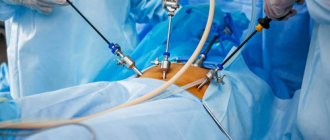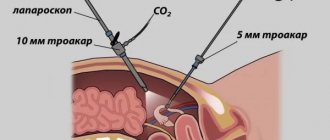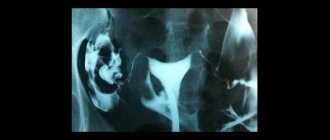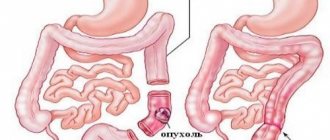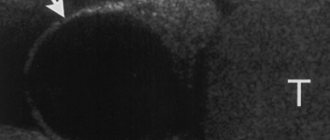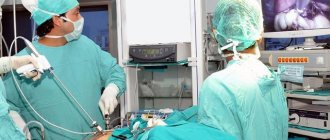Laparoscopy is a method of visual examination of the abdominal and pelvic organs using a miniature video camera-laparoscope, which is inserted inside through a small puncture of soft tissue.
Our expert in this field:
Allahverdyan Alexander Sergeevich
Surgeon-oncologist, professor, MD. Head of the ROH expert group. International expert
Call the doctor Reviews about the doctor
Diagnostic laparoscopy is a minimally invasive examination method. At the same time, it provides significant advantages, since the doctor can visually examine the internal organs and examine them in detail.
In some cases, visual examination of organs through laparoscopy provides more valuable information than x-rays, ultrasound, CT or MRI. The laparoscope video camera has a high resolution; the image from it is transmitted to the monitor and can be enlarged many times. This makes it possible to detect tumors of the smallest size at an early stage of the development of cancer.
What organs can be examined by laparoscopy?
Diagnostic laparoscopy is used to examine the abdominal organs, as well as in gynecology, to examine the pelvic organs and female reproductive system.
In recent decades, the use of this method has become increasingly widespread. Doctors are fully appreciating its benefits and are using it more and more often.
At the international clinic Medica24, laparoscopy is used to examine:
- liver,
- gallbladder,
- stomach,
- spleen,
- intestinal loops,
- greater omentum,
- diaphragm,
- Bladder,
- fallopian tubes,
- uterus,
- ovaries.
Happy stories
Polina
Sep 30 2021
Many thanks to your clinic and especially to Dyana Omarovna!! IVF I got pregnant on the first try, my son is already 5 years old!!! I'll come again!!!
Read the story
Svetlana
11 Sep. 2021
We would like to express our gratitude to the Fertimed clinic and in particular to the doctor from God Efimova Maria Sergeevna, she is our guardian angel thanks to her professionalism
Read the story
Sadovskaya-Shmeleva Tatyana Viktorovna
15 Jul. 2021
On May 4, 2021, a baby weighing 3150 grams and height 50 cm was born. This happiness cannot be expressed in words. Especially when the path to it is very long and difficult.
Read the story
Dzagoev family
May 03, 2021
Now I want to write my own story of happy motherhood. I have 9 years of infertility behind me, 4 IVF attempts, 3 of them were unsuccessful! 1 attempt was
Read the story
Svetlana
23 Feb 2021
I would like to express my deep gratitude to Tatyana Evgenievna Samoilova! Thanks to her, I am a happy mother! Our acquaintance began back in 2010, when
Read the story
Grineva Gulnaz
19 Feb 2021
I would like to express my deep gratitude to the doctor from God, Anna Anatolyevna Smirnova! It is thanks to her that we have been happy parents for five years now.
Read the story
Olga
23 Jan 2021
Our boy’s life began in Fertimed. Exactly 5 years ago they gave us his first photo, in it he was 8 weeks and 1 day old. What about us, future parents?
Read the story
Oksana
23 Dec 2020
I would like to express my gratitude to the MOON AND BACK to Diana Omarovna, Margarita Beniaminovna, Mikhail Yuryevich for our son, whose birth we are almost
Read the story
Natalia
29 Nov. 2020
I am 40, my husband is 49. We have a male factor, which makes it very difficult to get pregnant: most embryos stop on the 5th day of development. Except
Read the story
Elena
13 Nov. 2020
Our Moscow holidays were spent at the Fertimed clinic to fulfill our deepest desires. After endless attempts to get pregnant with...
Read the story
Marina
Oct 11 2020
It is impossible to express in words all the gratitude to our wizard - Torchinov Aslanbek Ruslanovich!!! Thanks to him, our baby was born on March 29, 2020.
Read the story
Irina
12 2020
I would like to express my deep gratitude to all the employees of this center for their professionalism. I would like to say a special HUGE THANK YOU to our doctor
Read the story
Orlova Olga Aleksandrovna and Chemodurov Dmitry Leonidovich
24 Jul. 2020
We would like to express our deep gratitude to all the doctors at this clinic! Thanks to you, we have two wonderful children growing up in our family - Zakhar (24.0
Read the story
Oksana
29 Jun 2020
Hello! We have an unusual story. My husband and I had our first children born in EB. Because We always wanted a very large family, so we decided not to stop..
Read the story
Evgeniya
May 16, 2020
My children are already 11 and 8 years old, but I periodically remember you with gratitude, dear Fertimed. Especially Anna Anatolyevna, Diana Omarovna, Margar
Read the story
Irina
17 Apr 2020
We owe our happy story to Anna Anatolyevna Smirnova! Thanks to her professionalism, our son was born. Anna Anatolyevna - they will notice
Read the story
Nikolai and Ekaterina
19 Feb 2020
Dear FertiMed, my wife and I want to sincerely thank the wonderful doctor, smart woman and great professional - Anna Anatolyevna Smirnova and sk
Read the story
Maria
10 Dec. 2019
Two years of unsuccessfully visiting doctors with my husband. We were advised to contact Zhordanidze Diana Omarovna in Fertimed. Wonderful doctor! Rezul
Read the story
Alipat
Oct 21 2019
Thanks to you, your clinic and Anna Anatolyevna Smirnova, I came to my cherished dream after 7 years of wandering from one doctor to another. Thankfully, I found out about
Read the story
Natalia
09 Oct 2019
I'll write a story too. 7 years of infertility, 3 IVF attempts. Out of desperation, I go and ask for a referral for laparoscopy. And in the intensive care unit I got into a conversation with a woman. TO
Read the story
Natalia
20 Feb 2019
Hello. I want to express my deep gratitude to your center. I got the impression of a close-knit team focused on results. Were treated by
Read the story
Andrey and Alexandra
14 Feb 2019
Many thanks from our entire large family to all the employees of the center for your work, for the smile on your face and faith in a positive result! Mihai
Read the story
Valentina
15 Jan 2019
My husband and I’s path to the happiness of being parents began in 2012 after the sounds of Mendelssohn’s wedding march died down. Like everyone else, we thought
Read the story
Catherine
May 16, 2019
After marriage, I couldn’t get pregnant at the age of 22; it turned out to be problems with the fallopian tubes. When I found out that I could never have anything on my own
Read the story
Olga
02 Mar 2019
I would like to express my deep gratitude to the FertiMed clinic, and especially to doctor Aslanbek Ruslanovich, for his good, caring attitude, and also for his
Read the story
Irina
23 Jun 2018
I would like to express my deep gratitude to the wonderful doctor of the FertiMed clinic, Aslanbek Ruslanovich Torchinov, for our long-awaited son. On hold
Read the story
Yuri
May 15, 2018
It will probably be an unusual review, since this is a review from a new father, and in general, I don’t really understand how I can express ours to you,
Read the story
Catherine
15 Dec. 2017
We first turned to FertiMed back in 2010, after 3 years of visiting doctors and undergoing all sorts of exotic tests. Unfortunately, the first
Read the story
Catherine
25 Sep. 2017
I got married at 22, my husband was 23, I never thought that there might be problems with conception, it turned out after I had appendicitis in childhood.
Read the story
Elena
May 23, 2017
My husband and I dreamed of having a child for 6 years. I have an adult daughter (20 years old) from my first marriage; my husband had no children. Passed several attempts at Eco in p.
Read the story
Elena
21 Feb 2017
My husband and I wanted more than anything to become parents, but time passed, wandering around to different doctors led to nothing, constant tests and treatment
Read the story
Nina and Peter
27 Sep. 2017
My husband looked at his spermogram as if it were a death sentence - not a single sperm count. And the reason is unclear. There was only one hope - for TEZU. It was explained to us that
Read the story
Faith
18 Jul 2016
I was ready to do anything to have a baby. By the age of 32, I had already undergone five operations on my ovaries and only one tiny piece remained from them. Nasty
Read the story
Maria
27 Jun 2016
I had two ectopics and no chance of having my baby. The irony was that my closest
Read the story
Valentina and Mikhail
Oct 14 2016
My husband and I flew from Kamchatka. They really wanted a second child. FertiMed was recommended by friends. They say that small and thin women like me have
Read the story
Sophia
27 Jul 2016
At FertiMed, at first they didn’t believe that I had 43 IVF attempts. There was clearly distrust and sympathy in the eyes of the staff - they say the woman went crazy.
Read the story
Alya
30 Sep. 2016
When I left my husband, with whom we had three children, no one, of course, could understand this, and no one wanted to. And even more no one could understand what m
Read the story
Valentina and Victor
01 Nov 2016
Our Dasha is growing up, at 1 year and 9 months she is a very smart girl, learning the alphabet on her own tablet (a real one, not a toy one)
Read the story
Christina
05 Apr 2016
I was 45 when I was ready for IVF. At the first meeting, the doctor at FertiMed said: there is no chance of having a child with my own eggs. At first there were sh
Read the story
Yana
13 2016
I am 29 years younger than my husband. He has three adult children, but I really wanted my child and ours together. Over the past few years, my husband has been very
Read the story
Anna
01 Mar 2016
I'm a happy mom! 5 years of standing with a birch tree, measuring basal temperature, tracking ovulation, hysteroscopy, laparoscopy (for my husband too), clostil
Read the story
However, the possibilities of operative laparoscopy are limited. Performing major reconstructive operations is possible only during transection. The effectiveness of infertility treatment after such operations is very low.
Advantages
Diagnostic laparoscopy is actively used in the international clinic Medica24 due to its advantages:
Maximum information content
During laparoscopy, the doctor can not only examine the internal organs in detail, but also take a tissue sample from a suspicious area or tumor.
The procedure for collecting a tissue sample is called a biopsy, and the tissue sample itself is called a biopsy. After receiving the biopsy, it is sent for histological examination. In the laboratory of the international clinic Medica24, a doctor examines the cellular structure of tissue under a microscope.
This allows us to make an unambiguous conclusion about the benign or malignant nature of the neoplasm.
In the second case, histological examination shows the degree of malignancy of the tumor (differentiation of cancer cells), its type. This is invaluable for choosing treatment tactics for cancer.
During a histological examination of a biopsy obtained during pelvic laparoscopy, the doctor examines the sensitivity of the tumor to hormones (estrogens, progesterone), as well as the presence of HER2 protein receptors. Sensitivity to various chemotherapy drugs is studied. The tactics of chemotherapy, immunotherapy, targeted therapy, and the decision to use certain drugs depend on this.
The risk of relapse after removal of the tumor, and therefore the extent of surgical intervention, depends on the degree of malignancy of the tumor (differentiation of tumor cells).
Thus, diagnostic laparoscopy is not only a visual examination of the internal organs of the abdominal cavity and pelvis, but also a way of taking tissue samples (biopsies), examining them and obtaining information that cannot be obtained by any other means.
Minimal invasiveness
The laparoscope and biopsy instruments are inserted into the abdominal cavity or pelvic area through small punctures. The procedure does not require incisions like open surgery. After it there are no scars left, there is no need for stitches.
The traumatic effect on soft tissues during diagnostic laparoscopy is minimal. Therefore, it does not produce side effects, complications and is highly safe.
Fast rehabilitation
After laparoscopy, a long rehabilitation period is not required, which also distinguishes it favorably from open surgical interventions.
In general, laparoscopy helps the doctor obtain maximum diagnostic information with minimal surgical intervention. This determines its widespread use in the diagnosis of cancer and other diseases.
We will call you back, leave your phone number
Message sent!
expect a call, we will contact you shortly
Possible consequences
The likelihood of complications with minimally invasive interventions is extremely low - 1-3 per 1000 cases. The risk group consists of women with a high body mass index, concomitant diseases, and a history of surgery on the pelvic organs.
Most often, intervention leads to the following consequences:
- allergic reaction to painkillers;
- re-development of the underlying disease;
- damage to nearby organs;
- bleeding;
- thromboembolism.
During the recovery period, infection and poor healing of wounds, divergence of postoperative sutures are possible. To minimize the likelihood of complications, you need to strictly follow your doctor’s recommendations. In Moscow, in paid clinics, such a minimally invasive intervention for diagnostic purposes can be done for 40,000 - 60,000 rubles. As complexity increases, the cost increases.
Indications
Diagnostic laparoscopy at the international clinic Medica24 is performed for:
- suspected internal bleeding in the abdominal cavity or pelvic area,
- ascites,
- benign or malignant neoplasms of the abdominal cavity and pelvic organs,
- jaundice of unknown cause,
- pain in the abdomen, pelvic area, when their cause is unknown,
- infertility, obstruction of the fallopian tubes,
- endometriosis,
- ectopic pregnancy or suspicion of it,
- adnexitis, oophoritis,
- uterine fibroids,
- ovarian cysts,
- pancreatitis,
- suspected appendicitis, peritonitis,
- closed abdominal injuries.
What does the doctor see during laparoscopy?
Using a visual examination with a video camera, the doctor can:
- detect the presence of fluid in the abdominal cavity and find out the cause of its accumulation,
- examine defects in the walls of hollow organs,
- detect even the smallest tumors at the initial stage of formation,
- find out the cause of fallopian tube obstruction, infertility,
- detect rupture, torsion of the ovarian cyst and other acute conditions requiring emergency intervention,
- investigate inflammatory processes in the pelvic area and abdominal cavity, differentiate them from tumor diseases.
The capabilities of visual examination in some cases significantly exceed the capabilities of ultrasound and other hardware diagnostic methods (CT, MRI).
Progress of the operation
A woman may undergo surgery to remove adhesions in the fallopian tubes or dissection of adhesions in the area of the uterus, ovaries, and rectum. Before the intervention begins, the woman is given endotracheal general anesthesia. After the patient has fallen asleep, three incisions up to 2 cm long are made in the navel and bikini area. Through these holes, the doctor inserts instruments to manipulate the camera, air supply, and lighting. An inert gas is injected into the lumen of the pelvic cavity to lift the anterior abdominal wall and make work more comfortable. The surgeon examines the cavity, determines the presence of adhesions, grabs them with an instrument under the control of a video camera and carries out dissection and removal. Vessels damaged during the operation are cauterized with an electrocoagulator. After cutting the adhesions, the devices are removed from the punctures, sutures are placed on the incisions, processed and covered with a bandage.
How is the procedure performed?
Diagnostic laparoscopy at the international clinic Medica24 is performed under local anesthesia in combination with sedation or general anesthesia.
When examining the abdominal cavity, a small puncture is made in the navel area, through which a cannula is inserted and carbon dioxide or nitrous oxide is injected. The gas lifts and expands the walls, filling the abdominal cavity for a better visual overview.
After this, a miniature video camera with illumination on a flexible fiber-optic cable is inserted into the abdominal cavity. With its help, the doctor examines the internal organs in detail.
If it is necessary to take samples of tumor tissue, additional punctures are made through which instruments are inserted. With their help, the doctor performs a biopsy.
As a rule, the procedure takes no more than 40 minutes. Upon completion, the gas is removed from the abdominal cavity, and a bandage is applied to the punctures.
Laparoscopy of the pelvic area for gynecological diseases is not fundamentally different from the examination of the abdominal organs.
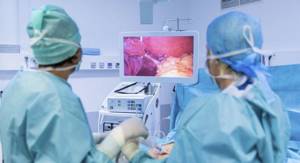
Laparoscopic hysterectomy: price in Moscow
Our clinic’s specialists have more than 18 years of successful experience in performing operations of this type. Thanks to highly qualified surgeons and many years of practice, we help our patients cure even the most complex and advanced stages of gynecological diseases.
The price of laparoscopic hysterectomy depends on the specific individual case. To find out the current cost of surgical treatment in our clinic, visit the “Prices and Promotions” section of the website or call.
Preparation
Diagnostic laparoscopy is a minimally traumatic examination method. And yet, it requires short-term hospitalization in the hospital of the international clinic Medica24, where all conditions have been created to ensure that the stay is as comfortable as possible.
During laparoscopy, large incisions are not made as in open surgical interventions, however, before it is carried out, a mandatory set of examinations is performed:
- General blood analysis.
- Blood test for coagulation (coagulogram).
- Tests for HIV, syphilis, hepatitis B, C.
- General urine analysis.
- Ultrasound of the pelvis.
- ECG (electrocardiography).
- Fluorography (x-ray of the lungs).
Laparoscopy is performed on an empty stomach. For 8 - 10 hours you need to stop eating and smoking. If you are taking blood thinning medications, you should stop taking them 2 weeks before the procedure.
In 2 - 3 days you need to go on a diet, eliminate the consumption of foods that provoke gas formation (legumes, yeast bread, cabbage, raw vegetables and fruits, etc.).
If laparoscopy is scheduled for the morning, a light dinner is allowed the night before. You can't have breakfast. Before the procedure, as a rule, a cleansing enema is performed.
Postoperative period
The recovery period after the intervention is not long. If there are no complications or complaints, the patient goes home the next day; pain and discomfort in the abdominal area disappear within 3-4 days after the intervention. Full recovery takes up to 4-6 weeks. During this time, a diet is needed to prevent gas formation and intestinal overload, limiting exercise, a temporary ban on intimate life, visiting a sauna, bathhouse.
After surgery, the sutures are treated with antiseptics for 6-7 days, then they are completely tightened. As they recover, they become almost invisible.
After the procedure
Laparoscopy is a minimally invasive diagnostic procedure. After the anesthesia or anesthesia wears off, within a few hours you can get up and walk, and you are allowed to eat.
For the first day or two days, it is advisable to stay in the hospital of the international clinic Medica24, where impeccable medical care and medical supervision will be provided.
We will call you back, leave your phone number
Message sent!
expect a call, we will contact you shortly
Contraindications
Diagnostic laparoscopy is not performed for:
- the presence of adhesions in the abdominal cavity,
- extensive blood loss and hemorrhagic shock,
- liver or kidney failure,
- decompensated conditions in cardiovascular diseases,
- acute respiratory failure,
- intestinal colic,
- bloating,
- diffuse peritonitis,
- large fibroids,
- acute infectious diseases,
- obesity 4 degrees,
- as well as in the 2nd - 3rd trimesters of pregnancy (for periods greater than 16 weeks).
The material was prepared by oncologist, chief surgeon of the international clinic Medica24, Konstantin Yuryevich Ryabov.
